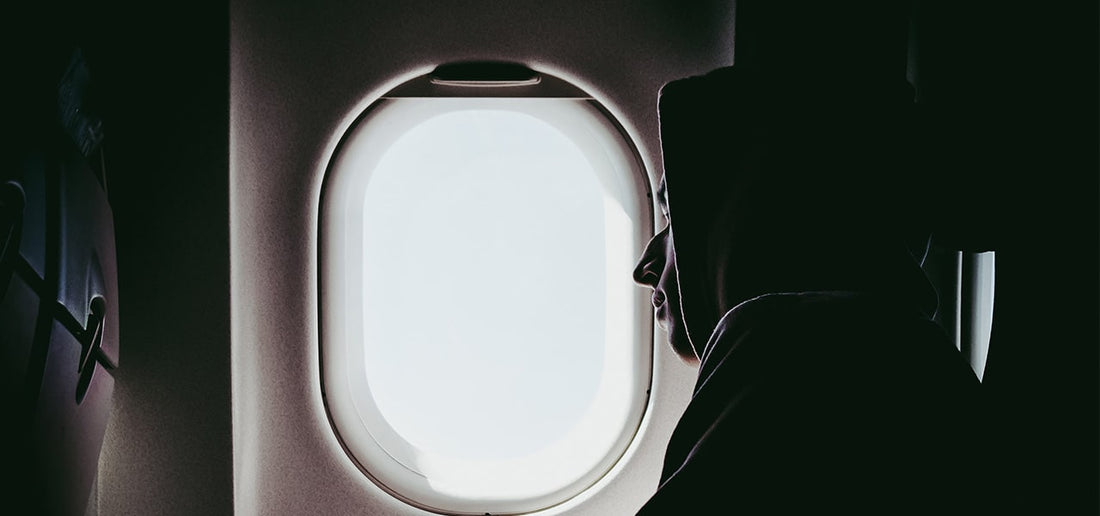How to beat jet lag

Jet lag is a sleep disorder that occurs when your internal body clock, or circadian rhythm, is no longer in sync with your local time.1 It happens as a result of air travel across long distances and multiple time zones.2 While temporary, it can impact your ability to fall asleep and wake up, leaving you feeling tired, moody, and unable to concentrate.3 Other symptoms include dizziness, anxiety, changes in appetite, and stomach-related disturbances.4
Jet lag is common and cannot be prevented.5 That being said, there are plenty of things you can do to mitigate its impact. The key is to sync your internal clock with the time around you as swiftly as possible.6 Studies point to the following ways by which you can do this.
- Light exposure: Light powerfully affects our circadian rhythm.7 Therefore timed exposure to and avoidance of light can help you to adjust quicker.8 Roughly speaking, exposure to light in the morning shifts your internal clock to an earlier time, while exposure to light in the evening shifts your internal clock to a later time.9 A simple recommendation is, in the new location, to seek light exposure in the morning after travelling eastwards, and in the evening after travelling westwards.10
- Melatonin: Field trials have found that the right dosage of melatonin, administered at the right time, can help reduce symptoms of jet lag and improve sleep quality.11 Results suggest that the ideal dosage amount varies between 0.5 to 5mg – though it’s probably best to consult your GP on this front, as there are both prescription and over-the-counter melatonin supplements, as well as dietary supplements, that can boost melatonin levels.
- Sleep aids: Sleeping pills and clinically proven supplements can also help you to fall asleep quicker and wake up with ease,12 though sleeping pills are addictive and should only be taken if your symptoms are severe.13 B・SYNC ON is a delayed-release wake-up supplement that helps you wake up naturally in the morning without feeling tired or groggy. It has no side effects, with laboratory studies suggesting it can be used to help you better manage your internal clock.
- Strategic scheduling of sleep: Adjusting your sleep schedule a few days before you travel so that it matches the hours when you will sleep at your destination is a simple yet effective way to minimise the effects of jet lag.14 However, an obvious downside to this is that it might impact your social or business life. If you’re expecting your stay in a new time zone to be brief – two days or less – then stick to your usual sleep routine and sleep patterns, as studies have found that to be effective in countering feelings of sleepiness.15
Tips to reduce jet lag
Taking into consideration the above, we’ve put together some practical tips for you to follow to help reduce the effects of jet lag. Most, if not all, contribute to good sleep hygiene and should improve the quality of your sleep.
Before your flight
- Get plenty of rest and try to sleep a few extra hours.16
- If practical, adjust your internal clock to that of the destination time. When travelling west, sleep an hour or two later than usual, and when travelling east, sleep an hour or two earlier.17 Do this a few days before you travel to give your body enough time to adjust.
- Plan ahead. Since stress is known to impact sleep quality,18 make sure you are packed and prepared for travel to avoid any last-minute complications.
During your flight
- Drink plenty of water.19 It’s easy to get dehydrated on long-haul flights, and dehydration can have an adverse impact on your sleep.20
- Avoid alcohol and heavy meals. The former can cause dehydration and is known to negatively influence sleep quality,21 while the latter can lead to indigestion and disrupt your sleep.22
- Try to get some sleep, especially if it’s night-time at your destination.23 Consider using eye masks and ear plugs to block out bright lights and intrusive sounds.
After your flight
- On your first day, set an alarm so you don’t oversleep, and try to spend time outdoors in natural sunlight to help your body clock adjust.24
- Exercise in the morning, not in the evening, to help you fall asleep.25
- Consider taking a sleep supplement like B・SYNC ON, which can help you better manage your internal clock, and wake up feeling refreshed.
- If you still struggle to get a good night’s sleep and feel exhausted during the day, take a short 15-minute nap. But avoid taking naps after 3 pm as they can impact your sleep in the night.26
Remember, jet lag is temporary. The above tips should go a long way towards helping you overcome any of its symptoms.
To find out more about how B・SYNC ON can help you to tackle jet lag, take a look at our information on how B・SYNC ON works and its active ingredients.
Sources
- https://www.nejm.org/doi/full/10.1056/nejmcp0909838
- https://wwwnc.cdc.gov/travel/page/jet-lag
- https://www.ncbi.nlm.nih.gov/pmc/articles/PMC2082098/
- https://www.nhs.uk/conditions/jet-lag/
- https://www.nhs.uk/conditions/jet-lag/
- https://www.nejm.org/doi/full/10.1056/nejmcp0909838
- https://link.springer.com/article/10.1007/BF00584704
- https://www.sciencedirect.com/science/article/abs/pii/S1087079208000865
- https://www.nejm.org/doi/full/10.1056/nejmcp0909838
- https://www.nejm.org/doi/full/10.1056/nejmcp0909838
- https://www.nejm.org/doi/full/10.1056/nejmcp0909838
- https://pubmed.ncbi.nlm.nih.gov/32754110/
- https://www.nhs.uk/conditions/jet-lag/
- https://www.nejm.org/doi/full/10.1056/nejmcp0909838
- https://www.ncbi.nlm.nih.gov/pmc/articles/PMC2082098/
- https://www.nhs.uk/conditions/jet-lag/
- https://wwwnc.cdc.gov/travel/page/jet-lag
- https://www.nhs.uk/every-mind-matters/mental-health-issues/stress/
- https://www.nhs.uk/conditions/jet-lag/
- https://www.sleepfoundation.org/nutrition/hydration-and-sleep
- https://pubmed.ncbi.nlm.nih.gov/29549064/
- https://www.nhlbi.nih.gov/files/docs/public/sleep/healthysleepfs.pdf
- https://www.nhs.uk/conditions/jet-lag/
- https://www.nhs.uk/conditions/jet-lag/
- https://wwwnc.cdc.gov/travel/page/jet-lag
- https://www.nhlbi.nih.gov/files/docs/public/sleep/healthysleepfs.pdf




